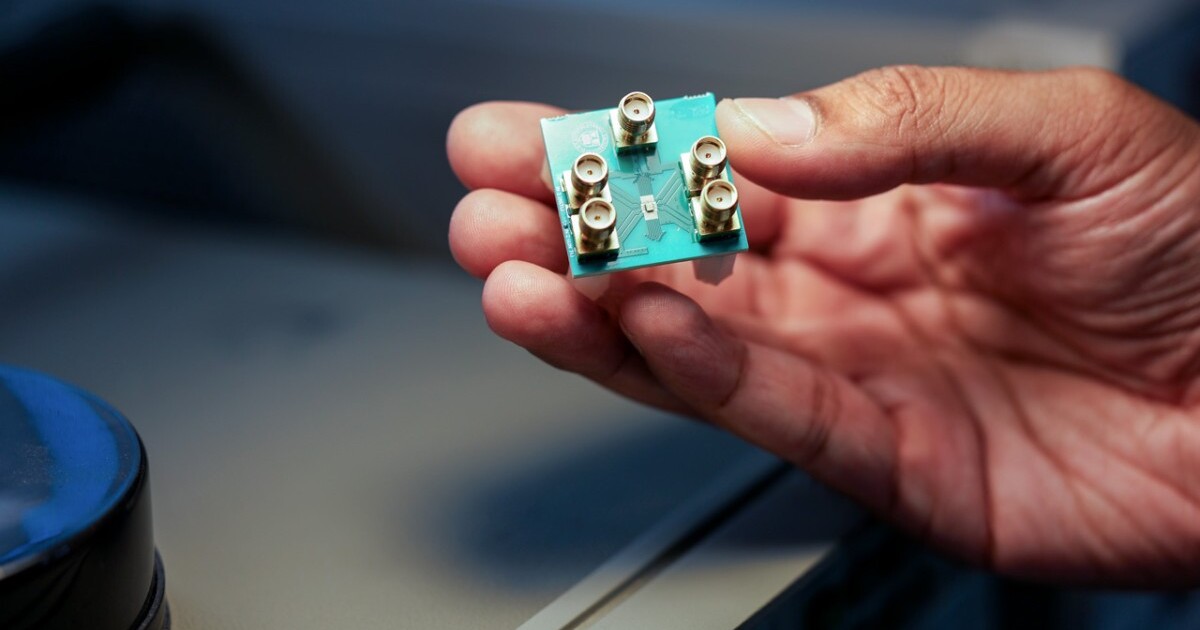Despite their imposing presence, quantum computers are delicate beasts, and their errors are among the main bottlenecks that the quantum computing community is actively working to address. Failing this, promising applications in finance, drug discovery, and materials science may never become real.
That’s the reason why Google touted the error correction capacities of its latest quantum computing chip, Willow. And IBM is both working on delivering its own “fault-tolerant” quantum computer by 2029 and collaborating with partners like Qedma, an Israeli startup in which it also invested, as TechCrunch learned exclusively.
While most efforts focus on hardware, Qedma specializes in error mitigation software. Its main piece of software, QESEM, or quantum error suppression and error mitigation, analyzes noise patterns to suppress some classes of errors while the algorithm is running and mitigate others in post-processing.
Qedma’s co-founder and chief scientific officer, Professor Dorit Aharonov, once described as a member of “quantum royalty” for her and her father’s contributions to the field, said this enables quantum circuits up to 1,000 times larger to run accurately on today’s hardware, without waiting for further advancements on error correction at the computer level.
IBM itself does both quantum hardware and software, and some of its partners, like French startup Pasqal, also develop their own hardware. But it sees value as well in partnering with companies more narrowly focusing on the software layer, like Qedma and Tiger Global-backed Finnish startup Algorithmiq, its VP of Quantum, Jay Gambetta, told TechCrunch.
That’s because IBM thinks driving quantum further requires a community effort. “If we all work together, I do think it’s possible that we will get scientific accepted definitions of quantum advantage in the near future, and I hope that we can then turn them into more applied use cases that will grow the industry,” Gambetta said.
“Quantum advantage” usually refers to demonstrating the usefulness of quantum over classical computers. “But useful is a very subjective term,” Gambetta said. In all likelihood, it will first apply to an academic problem, not a practical one. In this context, it may take more than one attempt to build consensus that it’s not just another artificial or overly constrained scenario.
Still, having a quantum computer execute a program that a classical computer can’t simulate with the same accuracy would be an important step for the industry — and Qedma claims it is getting closer. “It’s possible that already within this year, we’ll be able to demonstrate with confidence that the quantum advantage is here,” CEO and co-founder Asif Sinay said.
With a doctorate in physics, Sinay previously worked as a physicist at Magic Leap, then a multi-billion-worth AR company with a large R&D center in Israel. Like the founders of several Israeli startups, from Metacafe to Wiz, he is also a Talpion — an alum from Israel’s elite military program Talpiot, where one of his classmates was Lior Litwak.
Litwak is now a managing partner at Israeli VC firm Glilot Capital Partners, which led Qedma’s $26 million Series A through its early growth fund, Glilot+, which he heads. The round included participation from existing investors such as TPY Capital, which backed Qedma’s $4.7 million seed round in 2020, as well as new investors including Korean Investment Partners — and IBM.
Since last September, Qedma has been available through IBM’s Qiskit Functions Catalog, which makes quantum more accessible to end users. Sinay noted the synergies between the two companies, but emphasized that Qedma’s plans are hardware-agnostic.
The startup has already conducted a demo on the Aria computer from IonQ, a publicly listed U.S. company focused on trapped ion quantum computing. In addition, Qedma has an evaluation agreement with an unnamed partner Sinay described as “the largest company in the market.” Recently, it also presented its collaboration with Japan’s RIKEN on how to combine quantum with supercomputers.

The joint Q2B Tokyo presentation was co-delivered by Qedma’s CTO and third co-founder, Professor Netanel Lindner. An associate professor of theoretical physics and research group lead at Technion, he told TechCrunch he is hoping that some of his former doctorate students — or others they know — will join Qedma as part of the startup’s hiring efforts.
According to Sinay, Qedma will use the proceeds from its latest funding round to grow its team from around 40 to between 50 and 60 people. Some of these new recruits will be researchers and software engineers, but he said the startup also plans to hire for marketing and sales roles. “We are selling our software to the end users, and our partners are the hardware manufacturers.”
For hardware manufacturers like IBM, this software layer addresses the fact that a quant at a bank or a chemist who could leverage quantum are not experts in how to run circuits in the presence of noise. However, they know their respective domains and the conditions they want to set.
“So you want to be able to write the problem and say, I want it to run with this accuracy, I’m OK with this much usage of a quantum computer, and this much usage of a classical computer,” Gambetta said. “They want [these] to be essentially little options that they can put into their software; and that’s exactly what Qedma is doing, as well as some of [the] other partners we’re working with.”
Some researchers are already taking advantage of this via Qiskit Functions, or through partnerships that research institutions have established with Qedma and its industry peers. But the debate is still open as to when these experiments will become larger, and when quantum advantage will materialize for the broader world.
Qedma hopes to accelerate the timeline by providing a shortcut. Unlike error correction at the computer level, which adds overhead that limits scalability, Qedma’s approach doesn’t require more quantum bits, or qubits. “Our claim is that we can get quantum advantage even before a million qubits are achieved,” Lindner said.
However, other companies are approaching that issue from different angles. For instance, French startup Alice & Bob raised $104 million earlier this year to develop a fault-tolerant quantum computer whose architecture relies on “cat qubits,” which are inherently protected against certain errors, reducing the need for more qubits.
But Qedma is not dismissive of the race for more qubits; since it acts as a booster either way, its team wants hardware to have as many qubits as possible, and the best qubits possible. In practice, though, it will be hard to maximize both at once, just like software-based error mitigation typically means longer runtimes. The best choice will depend on the specific task — but first, quantum will have to get to those tasks.








